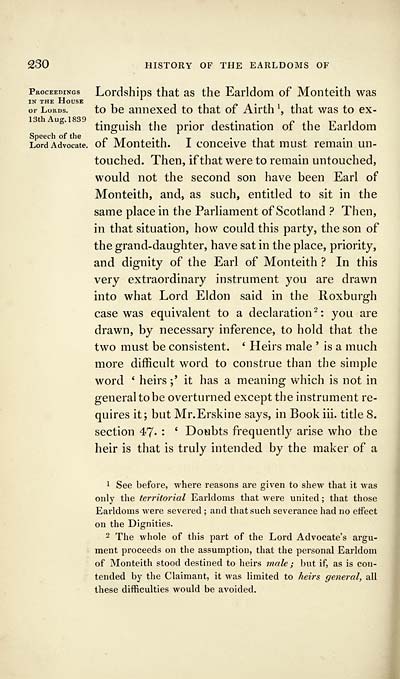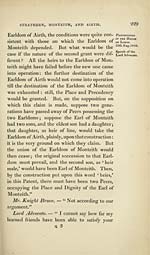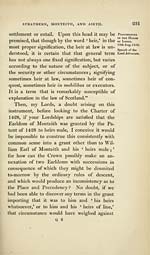History of the earldoms of Strathern, Monteith, and Airth
(258) Page 230
Download files
Complete book:
Individual page:
Thumbnail gallery: Grid view | List view

230 HISTORY OF THE EARLDOMS OF
Proceedings Lordshios that as the Eai'ldom of Monteith was
IN THE House ^ a •
OF Lords. to bc aimexcd to that of Airth ', that was to ex-
13th Aug. 1839 . • 1 , . 1 . . f 1 T-1 1 1
tinguish the prior destination oi the harldom
Speech of the p -i» /r • i x • i
Lord Advocate, ot Monteith. 1 coHceive that must remain un-
touched. Then, if that were to remain untouched,
would not the second son have been Earl of
Monteith, and, as such, entitled to sit in the
same place in the Parliament of Scotland ? Then,
in that situation, how could this party, the son of
the grand-daughter, have sat in the place, priority,
and dignity of the Earl of Monteith ? In this
very extraordinary instrument you are drawn
into what Lord Eldon said in the Roxburgh
case was equivalent to a declaration^: you are
drawn, by necessary inference, to hold that the
two must be consistent. * Heirs male ' is a much
more difficult word to construe than the simple
word * heirs ;' it has a meaning which is not in
general to be overturned except the instrument re-
quires it; but Mr.Erskine says, in Book iii. title 8.
section 47' • ' Doubts frequently arise who the
heir is that is truly intended by the maker of a
1 See before, where reasons are given to shew that it was
only the territorial Earldoms that were united ; that those
Earldoms were severed ; and that such severance had no etfect
on the Dignities.
2 The whole of this part of the Lord Advocate's argu-
ment proceeds on the assumption, that the personal Earldom
of Monteith stood destined to heirs male ; but if, as is con-
tended by the Claimant, it was limited to heirs general, all
these difficulties would be avoided.
Proceedings Lordshios that as the Eai'ldom of Monteith was
IN THE House ^ a •
OF Lords. to bc aimexcd to that of Airth ', that was to ex-
13th Aug. 1839 . • 1 , . 1 . . f 1 T-1 1 1
tinguish the prior destination oi the harldom
Speech of the p -i» /r • i x • i
Lord Advocate, ot Monteith. 1 coHceive that must remain un-
touched. Then, if that were to remain untouched,
would not the second son have been Earl of
Monteith, and, as such, entitled to sit in the
same place in the Parliament of Scotland ? Then,
in that situation, how could this party, the son of
the grand-daughter, have sat in the place, priority,
and dignity of the Earl of Monteith ? In this
very extraordinary instrument you are drawn
into what Lord Eldon said in the Roxburgh
case was equivalent to a declaration^: you are
drawn, by necessary inference, to hold that the
two must be consistent. * Heirs male ' is a much
more difficult word to construe than the simple
word * heirs ;' it has a meaning which is not in
general to be overturned except the instrument re-
quires it; but Mr.Erskine says, in Book iii. title 8.
section 47' • ' Doubts frequently arise who the
heir is that is truly intended by the maker of a
1 See before, where reasons are given to shew that it was
only the territorial Earldoms that were united ; that those
Earldoms were severed ; and that such severance had no etfect
on the Dignities.
2 The whole of this part of the Lord Advocate's argu-
ment proceeds on the assumption, that the personal Earldom
of Monteith stood destined to heirs male ; but if, as is con-
tended by the Claimant, it was limited to heirs general, all
these difficulties would be avoided.
Set display mode to:
![]() Universal Viewer |
Universal Viewer | ![]() Mirador |
Large image | Transcription
Mirador |
Large image | Transcription
Images and transcriptions on this page, including medium image downloads, may be used under the Creative Commons Attribution 4.0 International Licence unless otherwise stated. ![]()
| Histories of Scottish families > History of the earldoms of Strathern, Monteith, and Airth > (258) Page 230 |
|---|
| Permanent URL | https://digital.nls.uk/94882938 |
|---|
| Description | A selection of almost 400 printed items relating to the history of Scottish families, mostly dating from the 19th and early 20th centuries. Includes memoirs, genealogies and clan histories, with a few produced by emigrant families. The earliest family history goes back to AD 916. |
|---|

